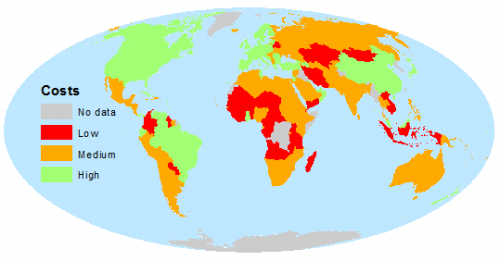Low-cost countries are not the best conservation investment

Published in PLOS ONE and titled "Cheap and Nasty? The Potential Perils of Using Management Costs to Identify Global Conservation Priorities", the research is the first to investigate links between conservation management costs and a range of factors that determine conservation success.
The research, which analysed conservation management, human rights, and governance data, found that countries with low costs generally had low levels of public involvement in conservation projects – resulting in donors becoming more reliant on governments to achieve things on-the-ground. However, worryingly the study also found that governments in low-cost countries scored poorly on bureaucratic quality, corruption and respect for human rights.
The research is particularly useful for international donors who play a major role in funding wildlife conservation projects throughout the world and need prioritisation strategies to make sure their money is well spent.
Dr Bob Smith, of the University of Kent's Durrell Institute of Conservation and Ecology (DICE), said: 'The conservation community is often reluctant to discuss negative issues that relate to their work, such as corruption and poor treatment of local people by government officials, which are probably more prevalent in some countries. Our study shows we need to investigate these issues further and develop approaches that account for and minimise their impacts.'
Erin McCreless of UCSC said: 'Our research suggests conservation donors need to consider a wide range of factors, beyond simply the direct working costs of projects, when choosing where to fund. This is because conservationists in low-cost countries have to spend more time and effort overcoming bureaucratic hurdles and ensuring their work does not have negative impacts on local people.'
More information: www.plosone.org/article/info%3Adoi%2F10.1371%2Fjournal.pone.0080893
Journal information: PLoS ONE
Provided by University of Kent

















